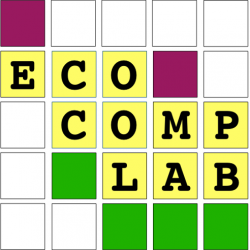Being a new lab means that we have open positions with full stipends, and new equipment 🙂 Students/postdocs with background in quantitative ecology/biology, physics, math, computer science, neuroscience, etc. who are interested in our research directions are welcome to apply. Research in the lab is computational and does not involve field or lab work. But we like working with empiricists! For students, we can do that via co-mentoring with a PI who has a wet lab or does field work.
Why join the lab
- Work on challenging, fun projects — we will work together to make sure you do what you are interested in within the scope of our research directions.
- Learn and use state-of-the-art theory and methods, preparing you for research within and outside academia.
- Work in a fun and engaging environment in the lab, the department and with collaborators.
- Close mentoring — my door is always open (but I won’t bug you if you don’t want me to!)
- Opportunities for international collaborations for suitable candidates.
Join us if you are...
- interested in the lab’s research directions (or overlapping ones),
- are able to work in a team,
- curious and love to learn new science,
- enthusiastic and creative (out-of the box thinking is encouraged),
- quantitatively oriented,
- have (at least) some basic experience with programming.
Funding

Open PhD and Postdoc positions: Response of ecological communities to novel environments (funded by HFSP)
How do organisms respond to environmental changes? What mechanisms promote their persistence? This is one of the most fundamental challenges in biology today. To explore it, join us in this exciting collaborative, international and interdisciplinary project! We have open positions in three countries!
What: This project will explore the response of ecological communities to environmental change, using bacteria as a model organism. We will use a combination of theoretical, computational and empirical work to study the interplay between species-level and community-level responses to perturbations.
Where: Positions are available in three countries:
- Computational and theoretical work will be done in the labs of Dr. Shai Pilosof (BGU, Israel) and Prof. Manlio De Domenico (Univ. of Padua, Italy).
- Experiments will be carried out in the lab of Dr. James Hall (Univ. of Liverpool, UK).
- This international project requires (already funded) travel to the collaborators’ labs.
Who: we are looking for Postdocs and PhD candidates who:
- Have excellent working relations, collaborate well and are team players.
- Have a strong background in quantitative analysis.
- Are curious, enthusiastic and creative.
- Have excellent English communication skills (speaking and scientific writing).
Specific expertise required for theoretical/computational work:
- Experience with modeling or mathematically studying ODE systems (e.g., epidemiological or LV models).
- Agent-based modeling is an advantage. For candidates with no experience — the ability to quickly learn ABMs.
- Strong programming skills in at least one of: Julia, Python, R, C++
Funding: The position offers a highly competitive fellowship and funding for traveling abroad to the collaborators labs, courses and conference.
How to apply: Please send a CV, a 1-page letter of why you are interested in joining and names of 2 referees (for recommendations) to the lab you wish to join:
- Dr. Shai Pilosof (BGU, Israel): pilos@post.bgu.ac.il
- Prof. Manlio De Domenico (Univ. of Padua, Italy): manlio.dedomenico@gmail.com
- Dr. James Hall (Univ. of Liverpool, UK): J.P.J.Hall@liverpool.ac.uk

Open position: The structure and dynamics of ecological multilayer networks
What: The analysis of ecological networks (e.g., food webs, plant-pollinator networks) has provided myriad insights into the structure, function and dynamics of communities and ecosystems. However, ecological networks have mostly been studied as isolated or aggregated systems, an approach that neglects the variation and dependence between different layers of ecological data that may be crucial to their functioning. Ecological multilayer networks is a framework that can incorporate dependence among networks but it poses new empirical and theoretical challenges. The goal of this PhD project is to develop theory and methodology for the analysis of ecological multilayer networks and to use these developments to analyze EMLNs of different kinds. The project will include cutting-edge network analysis applied to a variety of data sets. The student will gain significant experience with analyses of complex systems that can be applied in ecology or in other domains.
Where: The position is at the Ecological Complexity Lab at the Department of Life Sciences, Ben-Gurion University, Israel. There are also opportunities for academic visits to other labs abroad (depending on the specifics of the project and data used).
Who: we are looking for a candidate who:
- Has excellent working relations.
- Is quantitatively oriented (this is a computational project).
- Has experience with programming.
- Is curious, enthusiastic and creative.
- Has excellent English communication skills (speaking and writing).
How to apply: Please send a CV, a 1-page letter of why are you interested in joining and names of 2 referees (for recommendations) to: pilos@post.bgu.ac.il.


